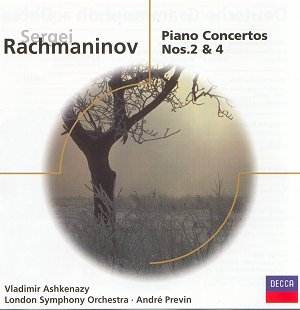RACHMANINOV
Piano Concerto No. 2
Piano Concerto No. 4
Russian
Rhapsody
 Vladimir Ashkenazy
(piano)
Vladimir Ashkenazy
(piano)
LSO/Andre Previn
(Previn and Ashkenazy in the Rhapsody)
rec 1972, 1979
 ELOQUENCE 467 453-2
[69.55]
ELOQUENCE 467 453-2
[69.55]
Crotchet
Commentary on the Eloquence series

These are classics of the Decca catalogue. Have they ever been out of
availability since their first issue? Their recordings coincided with and
helped make Rachmaninov's rehabilitation into the cultural world in the early
1970s. It must be a sure indicator of the passing of time that these premium
items now emerge to strengthen the Eloquence bargain line. Not much needs
to be said.
Ashkenazy is a sure technician as well as being an aristocratic and comprehensive
exponent of Rachmaninov's melancholic romance and tumblingly headlong virtuosity.
Previn, whose EMI recording of the Second Symphony well merits its classic
status (unlike his cooler interpretations of the flanking symphonies), partners,
goads and responds in authentic style. The inevitability and romantic feeling
invested by Previn and the orchestra is deeply affecting without for one
moment retreating into sentimentality. Try 4.40 in the first movement of
Rach 2. The Russian Rhapsody is an inconsequential makeweight; better
to have than not. A superb disc at bargain price and with sound quality of
emphatic poetry. What more could you ask? If I lean towards the even greater
passion of Earl Wild (1960s analogue recording but also at the now-demolished
Kingsway Hall) on a Chandos Enchant twofer (all four concertos and the Paganini)
the choice is generally a matter of personal taste and fine gradation. Horenstein
and Wild are much the superior in the opening of No 4 where the LSO and Ashkenazy
seem disconnected and momentarily rushed out of control. This compares with
the strutting defiant unanimity of Horenstein and Wild. The snarl and bark
of the brass in the closing minutes of the concerto is, by contrast, overwhelming
in the Eloquence version. No liner notes - a small loss to set against many
advantages. You will note the analogue origins of the concertos.
Rob Barnett

